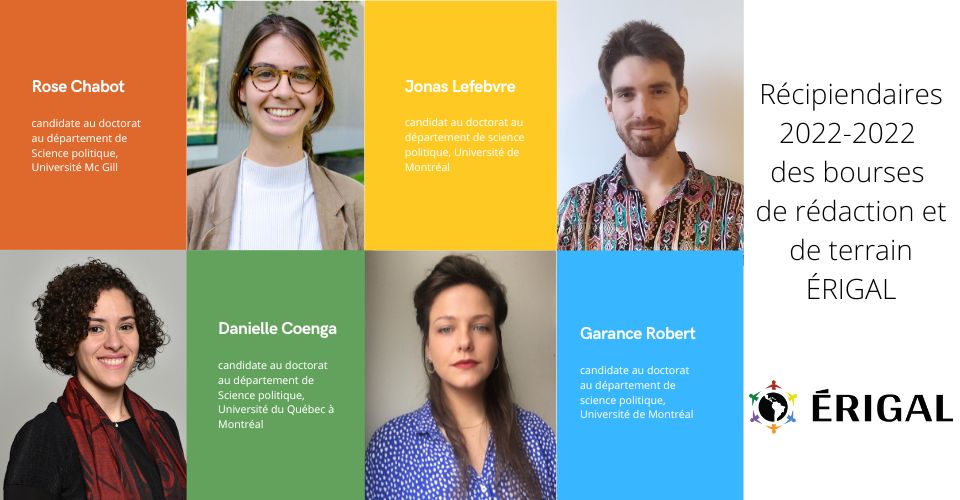Congratulations to the four recipients of ERIGAL s doctoral fellowships for 2022-2023!

ÉRIGAL is pleased to award 2 Ph.D.’s scholarships to support dissertation writing and 2 fieldwork scholarships for the year 2022-2023. Our recipients have very original and exciting research projects:
Rose Chabot, a Ph.D. candidate in political science at McGill University, received a scholarship for her dissertation which explores the role of feminist movements in generating institutional and social change in Argentina, at the provincial level. Through an interdisciplinary approach from comparative politics, public policy, and gender studies, she is interested in the ways in which feminist organizations and movements challenge states through different mechanisms of social accountability and impact public policy processes in two areas: reproductive health and gender-based violence.
Danielle Coenga, a doctoral candidate in Political Science at the University of Quebec in Montreal, is writing a dissertation entitled " Excluded bodies: antifeminism, anti-gender democracy, and amefricanity”. It focuses on the relationship between anti-gender antifeminist discourses (DAFAG) and democracy in a society marked by violent processes of colonization and by inseparable social hierarchies between gender, race, and class, which is the Brazilian society. Starting from the analysis of the political proposals of the legislative and executive power of the Brazilian state, its main question is: how do DAFAGs shape democracy? Specifically, it aims to 1) identify, in DAFAGs, which bodies are excluded as subjects of law by the Brazilian state, 2) understand the notion(s) of democracy underpinned by political representatives, and 3) propose an Afro-decolonial analysis of DAFAGs.
Jonas Lefebvre, a Ph. D candidate in political science at Université de Montreal who received a field scholarship, is questioning the legacy of participatory institutions in a context of democratic narrowing in Brazil. More specifically, adopting a sociological perspective, he will focus on the trajectories of the citizens who were involved in participatory institutions recently suspended.
Finally, Garance Robert a Ph.D. candidate in Political Science at Université de Montréal, also awarded with a field trip scholarship, proposes to explore the uses of human rights norms by human rights organizations through a comparison of Guatemalan and Nicaraguan groups. More specifically, she will attempt to shed light on how, for what purposes, and with what results these actors appropriate and use international human rights standards in local contexts that are a priori hostile to the promotion and respect of these norms.
Congratulations to all of them !


